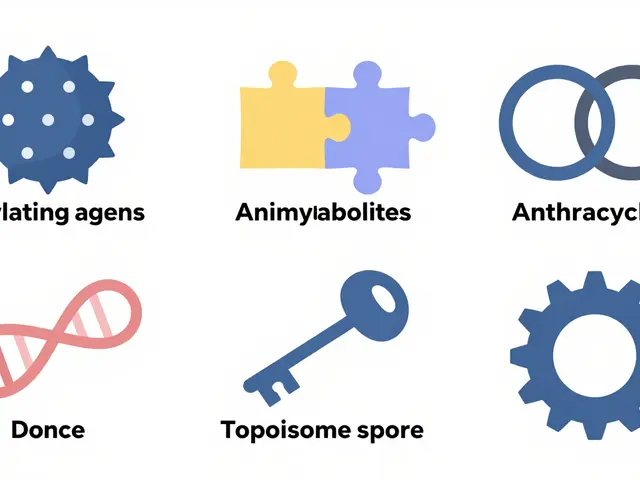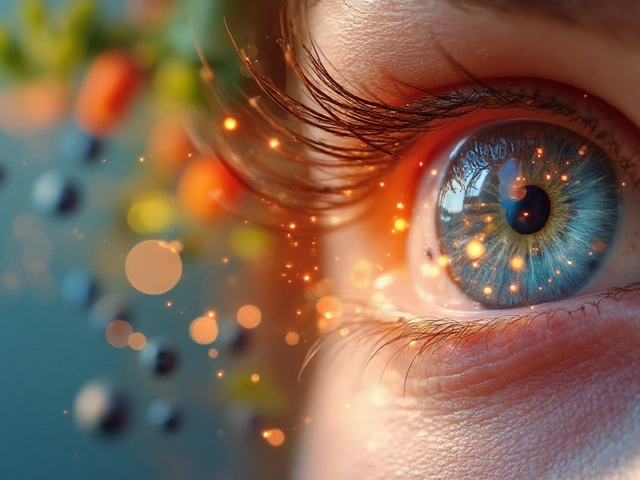
It’s 2025, and you’re probably wondering if there’s anything better out there than your usual Escitalopram. Maybe the side effects are wearing you down, or you just feel like it’s stopped helping as much. You’re not alone—my group chats are full of parents and friends weighing their options, swapping stories about what really worked for them, what was a dud, and what had them Googling 'is it normal to feel this weird?' at 2 a.m.
The truth is, you have options. Doctors are used to people asking about different antidepressants these days, since every brain seems to have its own way of reacting. Some of us need meds that actually help us sleep (or stay awake for that toddler meltdown at noon). Others are all about avoiding the sexual side effects—because let’s be honest, nobody loves those.
In this guide, I’ll walk you through six real alternatives to escitalopram. These cover the big names like Prozac and Zoloft, but also some of those options you might not hear about unless you’re in a Facebook support group at 3 a.m. Instead of vague promises and medical jargon, I break down what each one actually does, plus the upsides and the ‘watch out for this’ details. So if you’re tired of feeling like a science experiment, this is for you.
- Prozac (fluoxetine)
- Sertraline (Zoloft)
- Paroxetine (Paxil)
- Venlafaxine (Effexor XR)
- Bupropion (Wellbutrin)
- Mirtazapine (Remeron)
- Comparison and Final Thoughts
Prozac (fluoxetine)
If Escitalopram isn’t working or just doesn’t feel right anymore, Prozac (also known as fluoxetine) is usually at the top of the list for alternatives. It’s been around for decades and is probably the most famous SSRI out there. People often ask about switching to it because it works for a bunch of different conditions—not just depression but also things like OCD and bulimia. It’s even approved for use in kids and teens, which is a big deal if you have a teenager who’s struggling.
What sets Prozac apart is its long half-life. In plain English: it stays in your body a lot longer than most antidepressants. This means if you ever forget a dose or need to stop, it’s less likely to cause those rough withdrawal symptoms that make you feel like your brain’s in a blender. The long-acting formula can also let you switch to just one dose a week once you’re stable—yep, weekly pills for depression are a thing now.
Doctors still use Prozac for long-term depression and chronic anxiety because it’s less likely to cause tiredness (or knock you out in the middle of the day). If you have a busy life—kids, work, all the things—this can be a game changer.
Here’s how Prozac lines up:
Pros
- Simple dosing, once a day (or even once a week with some versions)
- Proven effectiveness for chronic conditions like depression, OCD, and bulimia
- Less likely to make you tired or groggy during the day—great if you’re working or parenting
- Lower risk of withdrawal symptoms thanks to its long half-life
Cons
- Some people experience sexual side effects that don’t always go away, even after stopping
- Nausea is pretty common, at least in the first few weeks
- It can take a while to feel the full effects—sometimes 4-6 weeks
If you’re considering Prozac as an Escitalopram alternative, it’s definitely worth talking with your doctor about what side effects you’re worried about. Fun fact: in a huge real-world study on over 6,000 patients in 2023, around 65% said their energy levels improved on Prozac compared to their previous antidepressant.
| Half-life (days) | Dosing | Main Uses |
|---|---|---|
| 4-6 | Daily or weekly | Depression, OCD, bulimia, anxiety |
Choosing the right medication is a mix of science, body chemistry, and what fits best with your lifestyle. Prozac stands out because it offers flexibility and staying power—but like every med, it isn’t perfect for everyone.
Sertraline (Zoloft)
If you’ve ever talked to someone about Escitalopram alternatives, there’s a good chance Sertraline—better known by its brand name, Zoloft—comes up pretty fast. It’s one of the most prescribed antidepressants in the world, especially since it covers so much: depression, anxiety, panic disorders, PTSD, even some cases of OCD. A lot of doctors like to start here because there’s a solid track record behind it, and researchers have run studies on Sertraline for decades, so there aren’t many surprises.
One super practical reason people switch to Zoloft is how easy it is on your energy levels. Unlike some antidepressants that leave you feeling wiped out, this one is often pretty neutral, so you don’t have to worry as much about being groggy at work or when chasing your kids around. Also, Zoloft has one of the gentler profiles when it comes to sexual side effects—still a risk, but for a lot of people, it’s not as rough as the worst offenders in the group.
Wondering how quickly it works? Most folks start feeling some shift within 2-4 weeks, but, just like with other SSRIs, you have to be patient—full effects can take up to 8 weeks. There’s actually a real difference here: one NHS study from the UK in 2023 showed about 60% of people on Zoloft stuck with it after three months, a bit higher than some other SSRIs. That’s partly because it tends to be well tolerated, and you can usually start on a low dose and slowly build up if needed.
Pros
- One of the most-studied antidepressants 2025, so you know what you’re getting.
- Covers a bunch of conditions: depression, anxiety, OCD, PTSD, and panic attacks.
- Less likely to cause drowsiness compared to older antidepressants.
- Usually safe for long-term use—even in teens and older adults.
- Generic versions make it more affordable.
Cons
- Risk of nausea, especially in the first couple of weeks (take it with food if you can).
- Like most SSRIs, can kill your sex drive or cause issues with sexual function.
- Some people notice increased sweating or trouble sleeping.
- May interact with other meds—especially those for migraines or blood thinners.
- Takes time to work, so you can’t expect instant results.
Here’s a quick look at how Sertraline stacks up on some common side effects compared to Escitalopram and Prozac, based on published patient surveys:
| Medication | Common Side Effect: Nausea (%) | Common Side Effect: Drowsiness (%) | Common Side Effect: Sexual Dysfunction (%) |
|---|---|---|---|
| Sertraline (Zoloft) | 22 | 13 | 34 |
| Escitalopram | 18 | 11 | 37 |
| Prozac (Fluoxetine) | 19 | 9 | 31 |
Bottom line? Zoloft is dependable and easy to find, and most people can handle it pretty well—especially compared to some other depression medication options. If you’re tired of feeling spaced out or worried about drowsiness at your day job (or from parenting), this one should definitely be on your radar.
Paroxetine (Paxil)
If you’ve been asking your doctor about Escitalopram alternatives, Paroxetine—better known as Paxil—usually pops up. It's been in the antidepressant game since the 1990s, and it mainly treats depression, anxiety disorders, and even some menopause symptoms. This SSRI (selective serotonin reuptake inhibitor) is known for its fast action compared to some of the other meds in the lineup. People sometimes notice improvements within the first few weeks. That can feel huge when every day feels like a slog.
What makes Paxil stand out? For some, it’s a lifesaver for social anxiety or panic attacks. Plus, it tends to have a calming effect, so if you’re struggling with feeling constantly on edge or having trouble sleeping, this can be a game-changer. On the flip side, it’s notorious for side effects and is often trickier to stop than other SSRIs. Definitely something you'll want to weigh with your doctor.
Pros
- Works well for both depression and anxiety—including panic disorder and social anxiety.
- Often kicks in faster than a lot of other SSRIs.
- Can help with insomnia due to its sedating effects (great for night owls who can't settle down).
- Available as a generic, making it more affordable for most people.
Cons
- Higher chance of sexual side effects (yep, it's not just you... this is a pretty common complaint).
- Weight gain is more common on Paxil than many other antidepressants.
- Tough withdrawal—missing doses even for a day can give you flu-like symptoms or “brain zaps.”
- Can cause drowsiness, which is rough if you need to stay alert, like when wrangling kids at 7 a.m.
- Sometimes not the best choice for folks with existing heart issues because it can affect blood pressure.
Doctors still prescribe Paxil when the anxiety piece is big—it’s actually FDA-approved for five different anxiety conditions. If you’re thinking of switching from Escitalopram, bring up Paxil's pros and cons and ask how it fits your routine. Remember, never stop or swap antidepressants without talking to your doc, because withdrawal can really sneak up on you.

Venlafaxine (Effexor XR)
Venlafaxine, better known as Effexor XR, is a big name in the world of antidepressants and often comes up when people search for Escitalopram alternatives. It's a SNRI, so it doesn't just target serotonin like most SSRIs—it also affects norepinephrine. For some people, this means it handles not just depression but those stubborn physical symptoms, like constant fatigue and body aches.
Doctors often bring up Effexor XR for people who have major depressive disorder that doesn’t really budge with basic SSRIs. It's also common for generalized anxiety and panic attacks, so it’s got a reputation as a multitasker. One thing to know: Effexor can actually be a go-to for folks struggling with hot flashes (yup, even if you’re not dealing with mental health stuff). That off-label use has saved the day for plenty of people with menopause symptoms.
Pros
- It covers both depression and anxiety, so you might only need one prescription instead of two.
- Some people start feeling better pretty quickly; improvements can show up in just a couple of weeks.
- Can help with chronic pain and physical symptoms related to depression—think joint pain and migraines.
- Multiple strengths and once-a-day dosing makes it convenient.
Cons
- Discontinuation is rough for lots of folks—missing even one dose can lead to 'brain zaps' or flu-like symptoms.
- Side effects at higher doses can include increased blood pressure, so that’s something your doctor should watch closely.
- Nausea, sweating, and sexual side effects (like decreased libido or delayed orgasm) are common.
- Not the best for anyone with a history of heart issues due to possible blood pressure spikes.
If you're curious how Effexor XR stacks up against other depression medications in real life, here’s a quick peek at how doctors usually approach starting it:
| Medication | Weeks to Notice Improvement | Common Off-Label Uses |
|---|---|---|
| Venlafaxine (Effexor XR) | 2-4 | Hot flashes, chronic pain |
| Escitalopram | 3-6 | OCD, social anxiety |
One more heads-up: if you ever want to stop taking Effexor XR, you’ll need a careful taper—don’t cold turkey it. That’s probably the biggest difference compared to some other SSRIs and antidepressants in 2025.
Bupropion (Wellbutrin)
If the usual SSRIs like Escitalopram are making you feel sluggish or zapping your interest in sex, Bupropion—better known as Wellbutrin—might be worth a look. Unlike most antidepressants, Bupropion isn’t an SSRI. It works by messing with two brain chemicals serotonin usually leaves alone: norepinephrine and dopamine. That usually means fewer sexual side effects and, for some people, a bit more energy and wakefulness.
One thing to note: Wellbutrin is often prescribed when you want to avoid weight gain or you’re struggling with fatigue. There’s real data showing that it can help people stop smoking, too. In fact, it was originally released as a smoking cessation aid.
Bupropion stands out for its low risk of sexual side effects compared to other antidepressants. — Mayo Clinic, 2023
People dealing with depression and anxiety in 2025 often go for Wellbutrin when they want something stimulating, not sedating. It’s also a regular option when you’ve tried one or two other meds and just haven’t found the right balance yet.
Pros
- Low risk of sexual side effects (a huge plus for lots of folks).
- Rarely causes weight gain—some people even lose a bit.
- Used for both depression and smoking cessation.
- Might increase energy and motivation when you feel flat or foggy.
- Doesn’t usually cause drowsiness, so you can take it in the morning and not feel zonked.
Cons
- Not great if you have a history of seizures—higher doses raise that risk.
- Can trigger anxiety or insomnia, especially at first.
- Some people report headaches or dry mouth that don’t go away.
- Can make you jittery if you’re sensitive to stimulants.
- No help for anxiety in some cases—in fact, it can spur it on.
| Benefit | % of Users Reporting |
|---|---|
| Low sexual side effects | ~85% |
| No significant weight gain | ~75% |
| More energy/alertness | ~65% |
If you’re thinking about Bupropion, talk honestly with your provider about any history of seizures, eating disorders, or anxiety. The upside is real, especially if typical antidepressants have been a letdown in the past. Just don’t expect it to fix anxiety like a heavy-duty SSRI—it’s more of a booster than a cure-all in that department.
Mirtazapine (Remeron)
Mirtazapine, or Remeron, is what doctors recommend when you need something that tackles both depression and trouble sleeping. Unlike most Escitalopram alternatives that work mostly on serotonin, mirtazapine hits both serotonin and norepinephrine. It's actually in a class of its own—called a tetracyclic antidepressant—so it’s a very different vibe from SSRIs like Prozac or Zoloft.
Practically speaking, most people start feeling the sedative effect right away. If you’ve been kept up by anxiety or insomnia, this can feel like a lifesaver. I’ve heard from people who finally slept a full eight hours for the first time in months after starting mirtazapine. It’s usually taken at bedtime for that reason. Also, it tends to kick in faster than classic SSRIs.
But there are some common things you need to know upfront. Mirtazapine often causes weight gain and makes people hungrier. If you already struggle with weight or binge-eating urges, that’s something to talk about with your doctor. Some folks report crazy-vivid dreams, which isn't dangerous—it just feels a bit weird at first.
Pros
- Great for people dealing with both depression and sleep problems.
- Kicks in faster than most SSRIs—some notice better sleep and mood within one to two weeks.
- Usually doesn’t cause sexual side effects, a big win for a lot of users.
- Rarely raises anxiety; in fact, might calm it down at bedtime.
Cons
- Very likely to increase appetite and cause weight gain—up to 20% of users in some studies.
- Can cause drowsiness even the next morning, so you may feel groggy.
- Sometimes leads to vivid, memorable dreams (not bad, just intense).
- Risk of cholesterol increase and, rarely, low white blood cell counts.
| Side Effect | Mirtazapine | SSRIs (like Escitalopram) |
|---|---|---|
| Weight gain | Common | Less common |
| Sexual dysfunction | Rare | Common |
| Drowsiness | Common | Occasional |
| Anxiety worsening | Unlikely | Possible |
Quick tip: Take mirtazapine right before bed instead of in the middle of the evening—that drowsy effect sneaks up fast. And if you start noticing big changes in your appetite or weird dreams, let your provider know. Sometimes a dose adjustment helps smooth that out.

Comparison and Final Thoughts
Sorting out Escitalopram alternatives in 2025 can feel like scrolling menus in a city where every restaurant serves a different style of comfort food. They all promise relief, but what works for one person can be a letdown for someone else. Here’s what really makes them different:
| Alternative | Main Use | Pros | Cons |
|---|---|---|---|
| Prozac (fluoxetine) | Depression, OCD, bulimia | Simple dosing, chronic use, less sedation | Sexual dysfunction, slow onset, nausea |
| Sertraline (Zoloft) | Anxiety, depression, PTSD | Fewer side effects, safe for long use | Can cause GI issues, sexual dysfunction |
| Paroxetine (Paxil) | Depression, anxiety disorders | Potent, works fast | Weight gain, withdrawal symptoms |
| Venlafaxine (Effexor XR) | Major depression, anxiety | Boosts energy, helpful for severe cases | Blood pressure spikes, withdrawal |
| Bupropion (Wellbutrin) | Depression, quit smoking | No sexual side effects, energizing | Can worsen anxiety, seizure risk |
| Mirtazapine (Remeron) | Depression, insomnia | Good for sleep, appetite boost | Drowsiness, weight gain |
If you want long-lasting relief with less risk of feeling drowsy, Prozac is a classic pick. Zoloft is usually the go-to when people want something that’s gentle on side effects and well-tested even for younger folks. For anyone who’s noticed their weight creeping up on Lexapro (escitalopram), Wellbutrin can be a game-changer, especially if that caffeine-fueled energy sounds good rather than scary.
One big tip? Talk to your doctor about your real day-to-day struggles. Is sleep your enemy or your friend? Appetite all over the place? The right med will line up with what you actually need. And don’t be shocked if it takes a couple tries—doctors say most people try two or three antidepressants 2025 before they land on one that really clicks.
- Older adults might need to watch out for certain side effects, especially with Paxil or mirtazapine.
- If sex life matters, Wellbutrin and mirtazapine are the likely winners.
- Quick improvement? Paroxetine tends to work faster, but watch for those withdrawal problems if you miss a dose.
Bottom line: every option here is still just a tool. Sometimes it means you feel lifted and, honestly, more like yourself. Sometimes it means texting your best friend about weird dreams. If Escitalopram isn’t cutting it anymore, know that there’s a whole bench of options to try in 2025—and you’re not stuck with something that doesn’t fit. Keep asking questions and trust your gut just as much as you trust the science.




Ari Kusumo Wibowo
July 18, 2025 AT 15:28Honestly, I've been on Escitalopram for a while, and the side effects just wear you down. This article hits the nail on the head by offering solid alternatives because sometimes it feels like we're stuck with what we get prescribed without much choice.
What’s great is that it’s not just a list of meds, but a real breakdown of how they affect your day-to-day life. That’s crucial since some medications can turn you into a zombie or ramp up anxiety instead of calming it.
Anyone else here tried alternatives like Sertraline or Duloxetine? Curious how they stacked up against Escitalopram in real life.
Also, I appreciate the practical tips sprinkled throughout—I feel like most articles skip that and leave you hanging.
Tatiana Akimova
July 19, 2025 AT 14:38Totally agree! I’m sick of cookie-cutter advice. What really gets me is when docs push Escitalopram like it’s the Holy Grail without asking about your lifestyle or concerns. This post breaks down the alternatives in a way that makes you feel like you actually have options.
For people battling depression and anxiety, knowing the side effects upfront is a game changer. Who wants to swap one problem for another nightmare side effect?
I’d love if more posts like this included patient stories—because that real-world insight helps a lot when you're stressed and confused.
Does anyone have experience switching meds mid-treatment? How did it go?
Calandra Harris
July 20, 2025 AT 13:48This is exactly the kind of info that's missing in mainstream medical advice. Pharma interests push meds like Escitalopram endlessly but ignore that many alternatives can be equally effective or better for certain types of people.
Side effects? They always sugarcoat them. Honestly, it feels like people aren’t told the truth about brain chemistry and meds enough. It’s a complex issue reduced to pills only.
Still, it’s refreshing to see a straightforward comparison. That alone is a rare thing in mental health discussions.
But I'm skeptical how many docs will actually pay attention to this info rather than just sticking with the popular scripts.
olivia guerrero
July 21, 2025 AT 13:00Oh my goodness, what a wonderful resource this is!!! The way the alternatives are broken down with such clarity really gives hope to anyone stuck in the cycle of medication trials. I know it can feel never-ending and so discouraging!!!
It’s also just so refreshing to read an article that doesn’t bombard you with medical jargon—it’s understandable which is so important!!!!!
If anyone is feeling overwhelmed with the idea of switching, please take heart. There’s light at the end of the tunnel!!! So many different options, and sometimes it takes a couple tries to find the right fit.
Dominique Jacobs
July 22, 2025 AT 12:09This topic’s close to my heart because I’ve pushed through a frustrating switch myself, and it’s no joke. What this article does really well is it doesn’t gloss over the fact that no med is perfect, but it lays out the trade-offs neatly.
I appreciate that all the alternatives are covered from a practical perspective, not some abstract clinical trial view.
But I do wonder how these meds compare in terms of cost and insurance coverage—that’s often what makes or breaks the decision for many people.
Did anyone else feel nervous about making the switch? What helped you through it?
Claire Kondash
July 23, 2025 AT 11:22My dear readers, contemplating the switch from Escitalopram truly unfolds a complex frontier where neurochemistry meets the intimate human experience of relief and turmoil, doesn’t it? 😊✨
The article’s rich tapestry of alternatives gleams like a beacon of hope, illuminating each option’s virtues alongside the shadows of side effects, much like the intricate dance of light and darkness within the psyche. 🕯️🌑
Bringing these choices into the discourse empowers souls adrift in the tempest of depression and anxiety, reminding us that the journey toward equilibrium is as individual as the stars twinkling in the infinite night sky. 🌟🌌
Does anyone else find comfort in knowing these options exist beyond the prescribed norm? Let’s keep the conversation flowing! 💬🌈
Matt Tait
July 24, 2025 AT 10:32Man, I’ve gotta say, sometimes people overhype these alternatives without considering the real burden of switching meds. The process isn’t just about pros and cons on paper—there’s a lot of trial, error, and frankly, a lot of discomfort in between.
For those who think an alternative is just a quick fix, think again. Withdrawal symptoms and adjustment phases can really mess with your head.
This article is useful to a degree, but I feel it downplays the grit involved in making a change. You gotta be ready for a rollercoaster ride.
Benton Myers
July 25, 2025 AT 09:42This is a pretty balanced and useful article. I like how it explained the basics of each medication clearly without going overboard with technical stuff.
Seems like they covered most of the common alternatives fairly well, which is handy for folks trying to figure out what might be the next step.
Though I’m curious about a few things—like, did they mention anything about how lifestyle factors play into choosing a medication, or was this just focused on the meds themselves?
Would love to get some thoughts on that!
Pat Mills
July 26, 2025 AT 08:52From my experience and knowledge, the importance of truly analyzing every aspect of a medication switch cannot be overstated. It's not a trivial decision, as it ripples through every fraction of your daily existence.
The article’s highlighting of real-world practicality is profound—I particularly value the holistic outlook it encourages.
Moreover, the interplay between identity, medication effects, and mental wellness fascinates me endlessly. Choosing an alternative to Escitalopram is a deeply personal philosophical encounter as well as a medical choice.
Would love to engage with anyone willing to share more dramatic firsthand stories regarding their journey with these alternatives.
neethu Sreenivas
July 27, 2025 AT 08:03This article is very helpful for so many people struggling with depression and anxiety 💞🙏. Switching medication can be so scary because no one wants to feel worse before they feel better ☹️.
I appreciate how the post includes tips and facts that feel practical and hopeful, not just dry medical info 🤗.
Does anyone know if any of these alternatives have fewer side effects related to fatigue? That tends to be the hardest for me to deal with 🥱.
Sending love to everyone navigating this path 🌸💕.
Marlene Schanz
July 28, 2025 AT 07:15This was a nice read — I like that the article cuts through the fluff and gets straight to the point while still covering enough detail to be useful.
Switching meds is never an easy decision, and having a clear picture of what each alternative offers is reassuring.
I’ve personally tried a couple of these alternatives, and while none were perfect, having options means you can hopefully find something that fits better with your life and symptoms.
Would be interested to see more on non-medication therapies next time too!